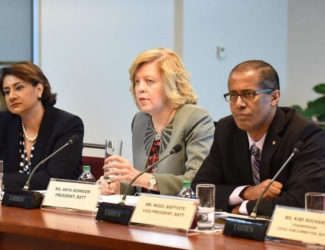(Trinidad Express) The Bankers Association of Trinidad and Tobago (BATT) has dispelled the notion that price fixing exists within the local banking sector.
Members of the Association appeared before a Joint Select Committee of Parliament this morning, where an inquiry into commercial banking fees continued.
According to BATT president Anya Schnoor, when it comes to setting or increasing fees and charges to customers, banks do so independently of each other.

Schnoor, who was among a panel of BATT executives reinforcing these points at a media brieifing following the JSC, said these fees and charges are set based on individual price considerations.
She emphasised that fees and charges represent between seven to 11 per cent of the total revenue of banks.
Schnoor said according to data by an international accounting firm, hired by BATT to collate information on the entire industry, bank fees and charges were adjusted only three times within the last ten years.
“Fees have not increased annually for any fee category analysed over the last 10 years,” she added.
“For some categories, there were no increases over the ten year period. Online and mobile options have remained free over the ten year period,” Schnoor noted.
She said almost all the fee categories in Trinidad and Tobago were comparably lower than those at banks within the region.
“The overall conclusion of this review is there is no price collusion among banks in setting fees and charges and bank fees and charges are determined by individual pricing considerations, which includes operating costs, competitive product, placement, influencing customer behaviour, alternate channels available and investment in technology,” she said.
On March 27, Canadian-based RBC Royal Bank increased some fees for its personal and business banking services. This caused an uproar among customers, with some threatening to take their business elsewhere.
Panel members at the media conference also spoke extensively on the role of banks in community and family development and said while banks employ around one per cent of the workforce, they contribute up to 11 per cent of the Gross Domestic Product (GDP).








